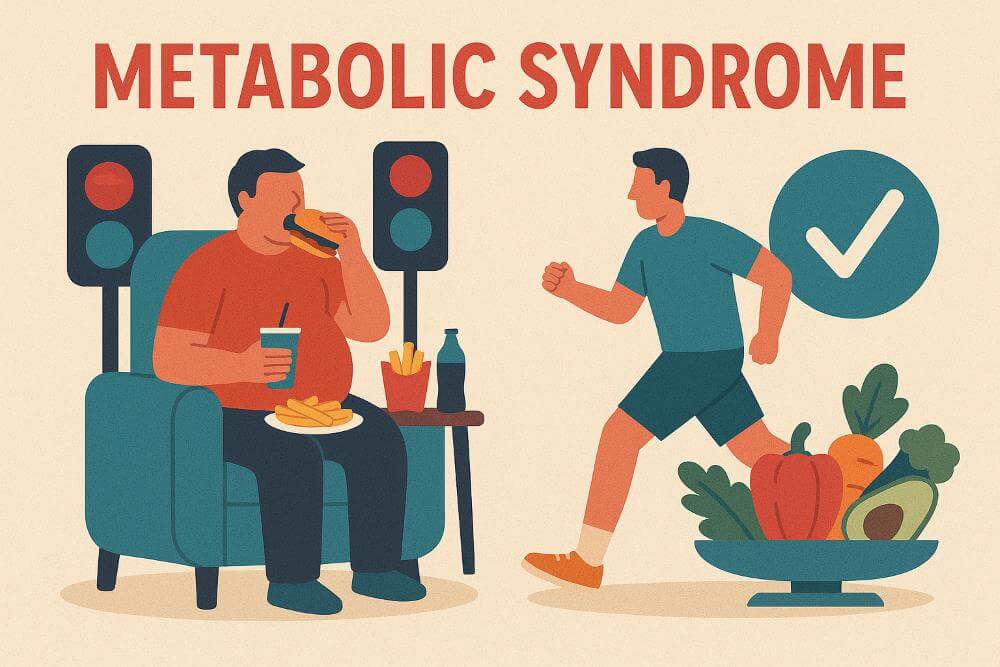4 min read, 734 words
What Is Metabolic Syndrome?
Metabolic Syndrome is a cluster of conditions that occur together, increasing your risk for heart disease, stroke, and type 2 diabetes. It isn’t a disease itself, but rather a diagnostic category used when someone has three or more of the following:
- Abdominal obesity
- High blood pressure
- High fasting blood glucose
- Elevated triglycerides
- Low HDL cholesterol
Having metabolic syndrome signals that your body is struggling with key aspects of metabolism—particularly how it processes and stores energy—and is on the path toward more serious chronic disease if left unmanaged.
What Does Metabolic Mean?
“Metabolic” refers to all the chemical processes your body uses to convert food into energy and maintain life. Think of it as your body’s engine. When this engine misfires—especially in how it handles fuel (carbs, fat, and protein)—you get metabolic dysfunction.
Diagnosis of Metabolic Syndrome
Metabolic syndrome is diagnosed when a patient has at least 3 of the following 5 conditions:
- Fasting glucose ≥100 mg/dL (or receiving drug therapy for hyperglycemia)
- Blood pressure ≥130/85 mm Hg (or receiving drug therapy for hypertension)
- Triglycerides ≥150 mg/dL (or receiving drug therapy for hypertriglyceridemia)
- HDL-C < 40 mg/dL in men or < 50 mg/dL in women (or receiving drug therapy for reduced HDL-C)
- Waist circumference ≥40 in (102 cm) in men or ≥35in (88cm) in women; if Asian American, ≥35in (90cm) in men or ≥32in (80cm) in women
Metabolic Dysfunction Results in Common Metabolic Diseases
Metabolic disease happens when your body’s systems for processing and storing energy break down. The most common types are acquired over time and include insulin resistance, type 2 diabetes, obesity, and non-alcoholic fatty liver disease (NAFLD). These conditions often start silently and progress over years.
They exist on a continuum—starting with hyperinsulinemia (high insulin levels), then insulin resistance, moving to prediabetes, type 2 diabetes, cardiovascular disease, NAFLD (non alcoholic fatty liver disease, pancreatitis and even cognitive decline.
Early Red Flags: Hyperinsulinemia & Insulin Resistance
- Hyperinsulinemia: High insulin levels, even when blood sugar is still “normal.” This can be detected with a fasting insulin test or an oral glucose tolerance test (OGTT) that includes insulin measurements.
- Insulin resistance: Cells stop responding to insulin, forcing the pancreas to pump out more, leading to inflammation and fatigue. It can be measured using the HOMA-IR score (calculated from fasting insulin and glucose) or a glucose tolerance test with insulin response.
Prevention & Management
The good news? Metabolic syndrome is largely preventable—and even reversible:
- Eat better: Limit ultra-processed foods, excessive added sugar, and refined carbs. Focus on whole foods, lean proteins, healthy fats, and plenty of fiber.
- Move your body: Daily exercise (cardio, strength training, walking) can improve insulin sensitivity even more than some medications. Be sure to move after a meal as well.
- Lose visceral fat: Belly fat fuels inflammation and insulin resistance.
- Lose weight: General weight loss helps reduce stress on your body, enhances overall metabolic function.
- Sleep & de-stress: Poor sleep and chronic stress spike cortisol and significantly disrupt your body’s ability to regulate metabolism effectively.
- Stay connected: Social isolation can worsen inflammation and metabolic health. Studies show that loneliness is associated with elevated markers of inflammation, higher cortisol levels, and a greater risk of metabolic syndrome and cardiovascular disease.
Track Your Progress
Keep tabs on fasting glucose, fasting insulin, cholesterol (HDL), waist size, and blood pressure. Early awareness = early action.
Important note: Unfortunately, fasting insulin—one of the most sensitive early markers of metabolic dysfunction—is not typically included in routine physical exams. You may need to discussed a possible need for this marker or request it specifically.
Fitness and Nutrition Support – Why the support matters
Personal trainers and Registered Dietitians are professional and serious sources for motivation, evidence-based knowledge, behavior change strategies, and sustainable healthy living. Their guidance empowers you to take control of your health, limit medications, and build habits that support lasting wellness – without a lifelong label like metabolic syndrome.
In summary
Metabolic syndrome is a serious warning sign that your body is experiencing early dysfunction in how it manages energy and fuel. It reflects underlying metabolic disease processes that, if left unaddressed, can lead to some of the most common chronic conditions—including diabetes, pre diabetes, heart disease, cancer, and dementia. Prioritizing metabolic health improves body weight, energy, reduces chronic disease risk, and supports a longer, healthier life—and ultimately, a life better lived.
– Coach Marie 🥦
Which vitamin helps the body absorb calcium?
Brought to you by your FNN coaches!







